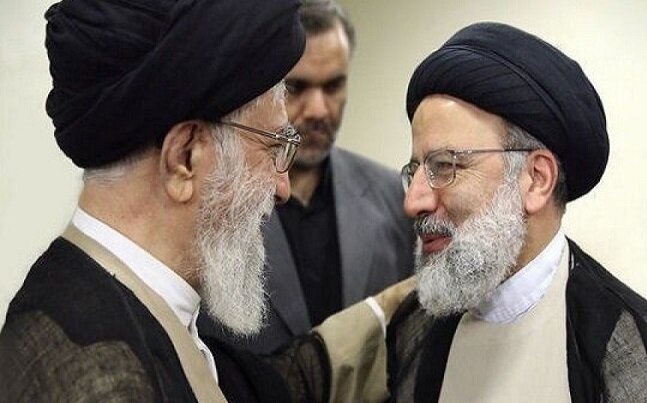Iran President Ebrahim Raisi with Supreme Leader Ali Khamenei (File)
As Iran inaugurates its 8th President, Ebrahim Raisi, the new administration faces water shortages and electricity cuts in the south, incomplete negotiations to restore the 2015 nuclear deal, an economy feeling the pinch of US sanctions and in the vise of long-term structural issues, and a worrying Coronavirus surge.
And it faces a potential diplomatic or even military confrontation in the Persian Gulf.
How much will the Raisi Government risk?
Raising the Stakes?
Fingers have been pointed towards Iran following incidents in the Persian Gulf, with an alleged Iranian drone killing two people on board the MV Mercer Street, followed by a boarding of armed personnel on the Asphalt Princess, both of which Iran vehemently deny they are responsible, but both scenarios are something that Iran can rightly claim as a show of force should they care to admit their role following more than a decade of Israeli actions, including cyber-attacks, assassinations of nuclear scientists, aerial assaults inside Syria, and strikes against shipping.
See also EA on The Newsmakers: Iran, Israel, and the War on Shipping
With diplomacy being suspended until September in the Vienna nuclear talks, a natural void is being filled, seemingly by military or pseudo-military action. That checks any possibility of sanctions removal — and thus not only further complicates the negotiations but adds a burden that could break the back of the Iranian economy. Raisi’s “smart engagement” in the region will be curbed in the short term, at least with Gulf states including the UAE and Saudi Arabia.
However, the planned appointment of new Foreign Secretary Hossein Amir Abdollahian could be seen as an olive branch to diplomacy. As the former head of the Ministry’s Arab and Africa desk, he has stated that Iran is open to improving ties with regional Arab states. He is also familiar with the nuclear negotiations, having played a vital part in the buildup to the 2015 agreement, including secret talks in Oman in 2012-2013.
Abdollahian has far more favorable ties with the Supreme Leader and Revolutionary Guards and Supreme Leader than those of his predecessor Mohammad Javad Zarif. So will the Raisi Administration and the office of the Supreme Leader acknowledge the diplomatic over the military path?
See also Iran’s President Rouhani: Parliament to Blame for US Sanctions and Nuclear Talks Failure
A Last Gamble?
Iran’s priorities are at home with an economy in need of repair, the shortages and blackouts, a pandemic killing almost 100,000 (and probably far more beyond the official total) and threatening to overwhelm the medical system, and authorities under fire for their mishandling of vaccinations.
With Raisi setting out his top priority as sanctions relief, and with Abdollahian as the face of diplomacy, it is unlikely that there will be an escalation of hard power in the Persian Gulf for now.
However, should Iran take a gamble and choose hard power over soft through pre-emptive strikes in the name of self-defense, the consequences could be damaging and possibly disastrous.
The Iranian Navy has proclaimed its navigation of new waters, across the Atlantic Ocean to Venezuela and north to Russia’s St. Petersburg. But with Israel already attacking Tehran’s shipping, those vessels are potential targets far from home. They lack the advance technology, conflict experience, and capability of their foes.
Israel also has demonstrated it can strike at the heart of Iran, as the former Mossad head Yossi Cohen has acknowledged, through the assassination of scientists and sabotage of nuclear facilities. The Israelis are striking Iranian targets in Syria, and could potentially hit Iranian-backed groups such as Lebanon’s Hezbollah or Yemen’s Ansar Allah (Houthis).
China and Russia will no doubt condemn Israeli actions; however, there may also be an eerie silence in their support of Iran as they measure their national interests. With the dynamics in the region, as seen in Afghanistan, Sino-Russian priorities may well lie beyond Tehran’s situation.
This could leave Iran isolated in an ongoing conflict — hence, Raisi’s declaration of “smart interaction with the world”, and his reiteration that Iran does not seek nuclear weapons, citing the fatwa of the Islamic Republic’s founder, the late Ayatollah Khomeini.
For now, Tehran appears to mulling its diplomatic-military dilemma. There is no sign of a resumption of the nuclear talks. Raisi’s office proclaims his phone calls with Russia’s Vladimir Putin and with China’s Xi Jinping.
The Supreme Leader chides the “unjust and malicious” West, but tough rhetoric does not substitute for resolution. As summer moves into autumn, the sanctions remain, the currency weakens, and trade continues to lag amid the deadliest wave of Coronavirus so far across the country.
How long can the dilemma be suspended?

